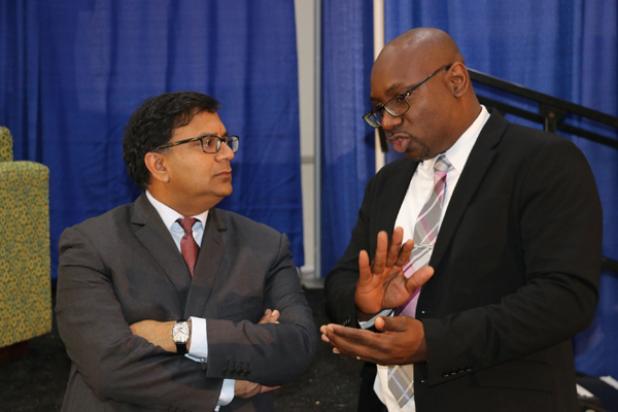
Economist, Professor Avinash Persaud (left) and Chief Executive Officer of the Financial Services Commission, Kester Guy.
impacts on financial system REVEALED
In the last year there have been several developments that have had or will have a significant impact on this island’s financial system.
Deputy Governor (Ag) of the Central Bank of Barbados, Michelle Doyle-Lowe, said these include the economy suffering a further loss of international reserves that requires a tightening of fiscal policy and a compression of domestic demand, and commercial banks being asked to increase their holdings of government securities from 10% to 20% of their domestic deposits.
She also recalled during the 9th Domestic Financial Institutions (DFI) Conference held at the Lloyd Erskine Sandiford Centre yesterday, that insurance companies with regional cross-border operations have been confronted by significant claims in the aftermath of the severe hurricanes; the accounting standard for provisioning against impaired loans changed as of the beginning of this year; and that the Government recently announced the suspension of external debt payments and the intent to restructure domestic debt.
“In particular, the impact of the new provisioning rules and the debt restructuring are uncertain, with the potential to compress the income of financial institutions. The on-going macroeconomic challenges require durable solutions for the public finances and the reduction of the debt burden. We are certainly mindful that these must be achieved while containing the impact on financial institutions, which have a fiduciary responsibility to depositors and investors and which serve the national interest by transforming savings into loans and other investments, in support of economic activity.”
The DFI Conference, an annual forum, provides senior officials from the Barbados’ financial sector with the opportunity to discuss issues that affect their operations as well as the wider economy.
Also reflecting on the twelve months since the last conference, Chief Executive Officer of the Financial Services Commission, Kester Guy said that it has become more apparent that financial systems are “morphing into a dynamic that is different from what we have been accustomed to.
“Whether the regulator chooses to respond or has the capacity to respond does not alter the transformation that is occurring before our eyes.”
According to Guy, innovation, technology, global standards, cross border access, the state of the economy and stakeholder demands are some of the examples that have introduced new risks for financial regulators to consider.
“We have sent signals of regulatory engagement for many years, as is the case now, and certainly this forum is such a form. It therefore implies that we cannot ignore the issues highlighted…While the reality is that we have not ignored the issues, the regulatory non-responsiveness at times might be because we ourselves are trying to grapple with or simply understand the issues; we are looking at how the regulatory toolkit can be appropriately tweaked, including legislative matters; and the need to thoroughly examine the issues to minimise the costs associated with regulatory errors.”
“These considerations are important for securing the resiliency of our financial architecture,” he stressed.
During the conference, the 2017 Financial Stability Report prepared jointly by the Bank and the FSC was launched.
This report provides an analysis of key financial system variables, assesses system-wide prudential indicators and examines the ability of the financial system to withstand economic shocks. This year’s report highlights that the financial system, though growing slowly, remained stable and is capable of absorbing sectoral shocks, however, there remains potential downside risks to the performance of the financial system. (TL)
